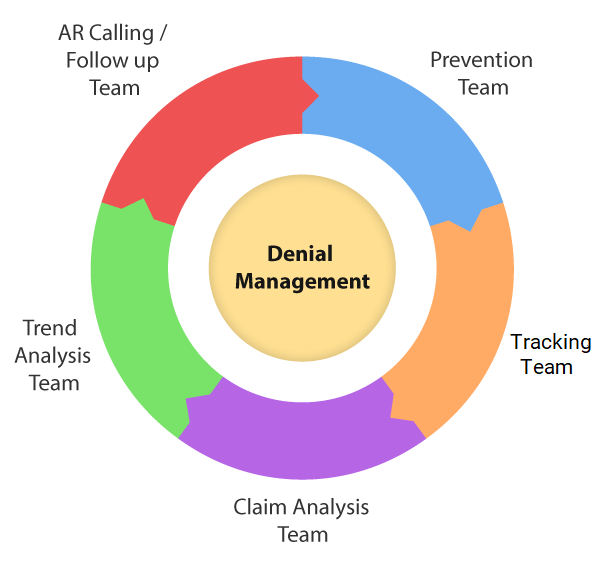Proven Strategies for 2025
Denial management in medical billing is one of the most critical processes for medical practices in 2025. Without it, claim denials can quickly lead to lost revenue and disrupt revenue cycle management. For many medical practices, claim denials are one of the most frustrating challenges in the revenue cycle management process. Every denied claim not only delays reimbursement but can also lead to lost revenue if not addressed properly.
In 2025, the focus on effective denial management is stronger than ever, as payers implement stricter requirements and healthcare organizations push for streamlined operations. A strong denial management strategy helps to reduce denials, improve cash flow, and maintain compliance. An effective denial management strategy is at the core of successful denial management in medical billing
To learn more about preventing denials, check our guide on Clean Claims in Medical Billing 2025
Why Denial Management Matters in 2025
Denied claims cost billions each year across the healthcare industry. Many are preventable with the right denial management process in place. The most common causes include:
- Coding errors that lead to incorrect claim submission.
- Missing documentation for medical necessity.
- Wrong patient or insurance details.
- Submitting under the wrong type of denial category.
A recent analysis by Veradigm found that nearly 65% of denials can be prevented if the root cause of denials is identified and corrected early.
Types of Claim Denials
Understanding the type of denial is the first step toward resolution. The major categories include:
- Soft Denials – Temporary denials that can be corrected and resubmitted.
- Hard Denials – Permanent denials, often linked to coverage or benefit issues.
- Preventable Denials – Related to coding errors or missing information.
- Clinical Denials – Often related to medical necessity or lack of prior authorization.
Resources like Find A Code help billers verify proper codes before claim submission to minimize denials.
The Denial Management Process in Medical Billing
An effective denial management process includes the following steps:
- Identifying Denial – Utilize claim reports and clearinghouse alerts to promptly detect issues.
- Analyzing the Root Cause – Review data and workflows to determine if errors are due to coding errors, missing documents, or payer rules.
- Correcting and Resubmitting Claims – Properly document and ensure accurate coding when resubmitting claims.
- Appeals Process – For claim denials based on medical necessity or payer errors, a structured appeals process is essential.
Tools like Rapid Claims and Data Rovers assist practices in managing denials efficiently with automation.
Denial Management in Medical Billing: Strategy for 2025
The best denial management strategy for 2025 focuses on prevention and process improvement:
- Staff Training: Regular coding updates from Lighthouse Lab Services reduce errors.
- Automated Verification: Platforms like Access One can verify eligibility in real time.
- Outsourcing Solutions: Partnering with providers such as iFive Global or Medical Billingz can streamline billing operations.
- Analytics & Reporting: Using data analytics from Datavant to spot trends in denied claims.
- Patient Engagement: Services like Bill Flash improve billing transparency and reduce misunderstandings.
For smaller practices, utilizing virtual assistants via Hello Rache can enhance follow-ups and support the denial management process.
The Cost of Poor Denial Management
Failure to invest in managing denials can have severe consequences:
- Increased lost revenue from uncollected claims.
- Reduced cash flow for medical practices.
- Higher administrative costs from repeated resubmission of claims.
- Negative impact on compliance for the healthcare organization.
A case study by Emerald Health highlighted how improving denial workflows reduced claim rejection rates by 25%, significantly improving practice cash flow.
Building a Denial Management in Medical Billing Strategy for 2025
Every practice needs a tailored denial management strategy that covers:
- Proactive auditing to find coding errors.
- Strong documentation for medical necessity.
- Clear policies for the appeals process.
- A team dedicated to following up on denied claims.
Organizations like BHM Healthcare Solutions and Billing Freedom provide consulting for building customized RCM strategies. With the right approach to denial management in medical billing, practices can safeguard cash flow in 2025.
It is the process of analyzing, correcting, and preventing claim denials to improve reimbursements and reduce lost revenue.
Most are caused by coding errors, missing documentation, or issues with medical necessity.
By implementing an effective denial management process, improving documentation, and using automation tools to verify eligibility before submission.
The appeals process helps providers challenge denials related to medical necessity or payer errors and recover revenue.
Without it, practices face increased lost revenue, reduced cash flow, and long delays in payment.










